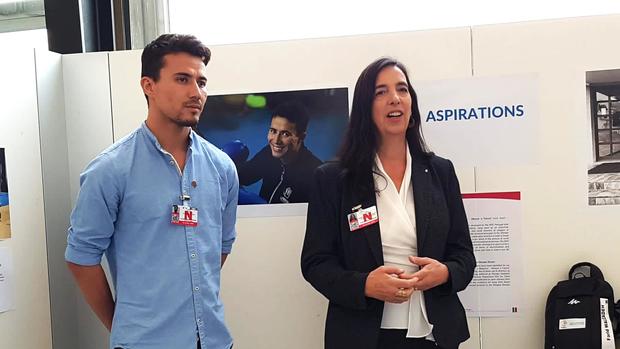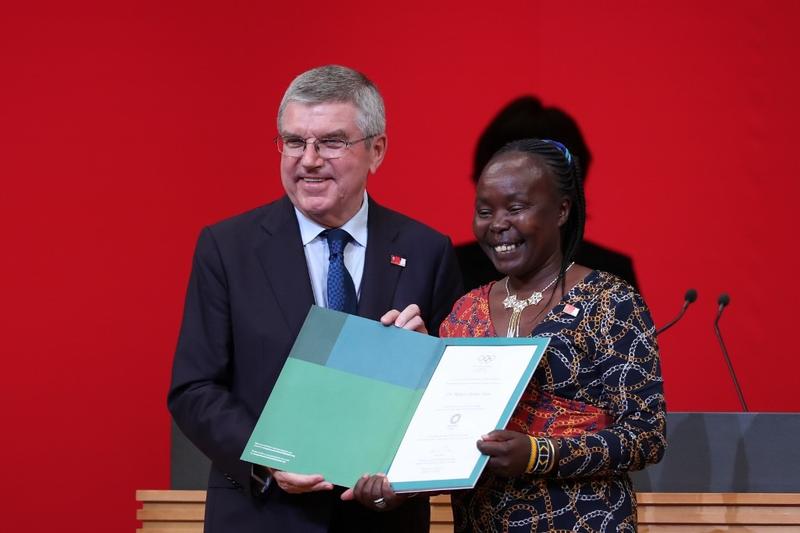 This photo taken from the official website of the Olympic Games shows boxer Farid Walizadeh (left) and fencer Wisam Sami sharing their journeys through sport at a session ahead of the Global Refugee Forum on Dec 16 2019.
This photo taken from the official website of the Olympic Games shows boxer Farid Walizadeh (left) and fencer Wisam Sami sharing their journeys through sport at a session ahead of the Global Refugee Forum on Dec 16 2019.
LISBON - A young Afghan refugee living in Portugal is attempting to achieve in 10 months what normally takes years of preparation - qualifying to box in the Olympics.
But 22-year-old Farid Walizadeh, who faces his first international qualification challenge next month ahead of the Tokyo 2020 games, is no stranger to uphill struggles.
ALSO READ: UN agencies help nation on key fronts
I work hard. I want to show people there’s always a second chance if they want it... That’s why I want to go to the Olympics. If I can do it, they can do it
Farid Walizadeh
At the age of seven, he fled his hometown in northeastern Afghanistan, traveling more than 2,500 km, mostly on foot, to Turkey. There he was arrested on arrival after smugglers he had met on the way loaded him up with a backpack they said contained sugar but was in fact filled with drugs.
“I’d lost my house, my childhood, my life ... but you can build everything again,” he said, speaking in English.
Farid’s mother had fled religious persecution to Pakistan. His father was in the military. Conflicts over land rocked the Afghan city where he lived with his adoptive parents. “I didn’t have a choice. I had to leave,” Farid said.
“We were a group of 200 people at first. But the mountains of Afghanistan are dry and cold, and the group became smaller,” he said. After entering Pakistan, he tumbled off the back of a truck and continued alone to the Iranian-Turkish border.
Housed in an orphanage in Istanbul, the nine-year-old began practicing kung-fu and taekwondo to defend himself from bullies.
“I had no protection from the boys on the street or in school,” he said. “They didn’t like refugees.”
 IOC president Thomas Bach (left) presents an invitation to the Olympic Games to chef de mission of the Tokyo 2020 refugee Olympic team, Tegla Loroupe, during a ceremony marking one year before the start of the Tokyo 2020 Olympic Games in Tokyo on July 24, 2019. (BEHROUZ MEHRI / AFP)
IOC president Thomas Bach (left) presents an invitation to the Olympic Games to chef de mission of the Tokyo 2020 refugee Olympic team, Tegla Loroupe, during a ceremony marking one year before the start of the Tokyo 2020 Olympic Games in Tokyo on July 24, 2019. (BEHROUZ MEHRI / AFP)
After five years in Istanbul, the UN Refugee Agency relocated him to Portugal, where he was taken in by a non-profit organization in Lisbon for unaccompanied minors seeking asylum.
“All I knew of Portugal was Cristiano Ronaldo. But I thought I’d go there and try a new life,” he smiled.
He started martial arts again, this time trying boxing. After five months, he rose to become the national cadet boxing champion, also winning a Human Rights Prize from Portugal’s parliament.
But as a refugee without Portuguese nationality, his career opportunities were limited.
REFUGEE OLYMPIC TEAM
In 2015, the International Olympic Committee (IOC) created the world’s first Refugee Olympic Team for the Rio 2016 games.
Farid, then 18, was in no condition to compete. He worked nights in a hotel and studied during the day to achieve his second big dream in life: becoming an architect.
But Portugal’s Olympic Committee had its eye on him, and last March he received a scholarship from the IOC to train full-time for the 2020 games that begin in July.
READ MORE: UN chief urges support for Pakistan's efforts on refugees
Farid’s coach Paulo Seco, who has sent various Portuguese boxers to the Olympics, is blunt about the challenge Farid faces: “This type of work is never done in 10 months. I’ve literally got to make him bleed to show people he can do this.”
Farid will compete in a qualifying tournament for European athletes in London next month in his bid to represent the Refugee Olympic Team, to be followed by a world tournament in Paris in May.
“I work hard,” he said. “I want to show people there’s always a second chance if they want it... That’s why I want to go to the Olympics. If I can do it, they can do it.”


